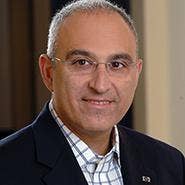HP Enterprise Group Reorganization: Blades, Converged Infrastructure Businesses Combined

Hewlett-Packard has reorganized a key part of its Enterprise Group by combining its blade server and converged infrastructure businesses under the direction of a seasoned HP server executive, according to an internal HP memo obtained by CRN.
According to the memo, which was sent to the HP Enterprise Group by Antonio Neri, senior vice president and general manager of the group, HP is integrating its Converged Infrastructure Business Unit with the HP Blades Business Unit to form the new Converged Data Center Infrastructure organization.
"To deliver on the promise of converged infrastructure, cloud and software-defined data center, we are streamlining our operating model. ... Converged Systems are essential to our future success and this alignment will enable us to get to market faster with several critical products in the pipeline for this year," Neri wrote in the memo.
[Related: Two Top 3PAR Storage Execs Leaving HP, According To Leaked Memo]
HP Converged Data Center Infrastructure will be headed by Ric Lewis, who until now was senior vice president and general manager for HP's enterprise server business.
Lewis is being replaced by Alain Andreoli, who is currently vice president and general manager of HP's Global Business Server Business Unit.
Neri, in the memo, also said that HP storage will be led by Vice President and General Manager Bill Philbin for the time being until HP has selected a permanent replacement for Senior Vice President and General Manager David Scott, who is planning on retiring March 6.
Bringing HP's enterprise server and converged infrastructure businesses into a single unit under one banner is good news, said Tom Holt, vice president of sales at Bedrock Technology Partners, a San Diego-based solution provider and longtime HP channel partner.
"HP's converged systems have definitely improved in the last six months," Holt told CRN. "Before, it was a challenge. Bringing it and the server business under Lewis is the right move for HP. The server guys have done it so right for so long."
HP has been busy adding money, incentives and programs to help its channel partners help the company be more than a server business, Holt said. "To grow, HP needs to get its server people doing more across the company," he said.
HP also made a wise move to bring Philbin in to run its storage business, even if only temporarily, Holt said.
NEXT: Combining HP's Blade, Converged Infrastructure Businesses Makes Sense
Prior to joining Palo Alto, Calif.-based HP, Philbin spent time at IBM and NetApp, giving him a lot of storage experience, said Bedrock Technology Partners' Holt.
"He's a very, very sharp guy, technology-wise as well as market-wise," he said. "He's a great guy to manage the storage business. His NetApp and IBM experience is a great addition to HP storage."
Rich Baldwin, CIO and chief strategy officer at Nth Generation Computing, a San Diego-based solution provider and longtime HP channel partner, told CRN the combination of HP's server blade and converged infrastructure businesses makes sense.
"Today, the majority of higher-end converged infrastructure systems are based on blades," Baldwin said. "But HP also has converged infrastructure based on Moonshot servers, and entry-level models based on EVO: Rail."
Converged infrastructure, or hyper-converged infrastructure, is where the market is going, Baldwin said. "Putting more focus on the business makes a lot of sense. And that is where [HP CTO] Martin Fink is going with The Machine, which will likely be available as a converged infrastructure solution. The Machine appears to be packaged with a blade."
Combining HP's blade server and converged infrastructure business will streamline efficiencies, Baldwin said. "HP has found it can have too many groups, and too many managers," he said.
Like Holt, Baldwin said that dealing with HP's converged infrastructure business was difficult in the past, but is much better now.
"The problem revolved around software," he said. "HP has its own CSA [Cloud Service Automation] management software, and sell's VMware's software. But last year, HP's sales reps got compensated only for selling the HP software stack. We had competitive situations with VCE where the customers said they were VMware shops but HP sales reps wanted only to sell the CSA."
STEVEN BURKE contributed to this story.
PUBLISHED FEB. 10, 2015